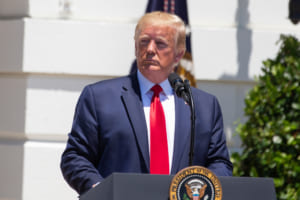United States President Donald Trump tweeted late in the evening on April 20th that he intends to sign an Executive Order (“EO”) temporarily suspending immigration to the U.S. as it battles the Covid-19 pandemic and the resulting mass unemployment. While concerning for many, Enterline and Partners would like to calm the fears of its current and potential clients.
 Mr. Trump is known for creating uproar through his tweeting and for being anti-immigration. Until the EO is signed, this most recent tweet should merely be taken as another of Mr. Trump’s inflammatory and anti-immigrant tweets.
Mr. Trump is known for creating uproar through his tweeting and for being anti-immigration. Until the EO is signed, this most recent tweet should merely be taken as another of Mr. Trump’s inflammatory and anti-immigrant tweets.
However, in the event that an EO is signed, we expect an immediate challenge in federal court. Depending on the severity and the restrictiveness of the EO, it is probable that a federal court judge will issue an injunction to prevent the EO from taking immediate effect. Such an injunction could last anywhere from 3 months to several years as the case works its way through the court system. If the federal court judge rules in favor of the EO, the litigants may always appeal to the federal circuit court and quite possibly the U.S. Supreme Court.
A worst-case scenario is that the President will request a direct and immediate review by the Supreme Court and thus bypass the usual appeals process. While such requests have traditionally been reserved only for the most urgent issues, Mr. Trump has used this tactic many times during his term. Such a request was made following the administration’s new Public Charge rule, which was taken up by the Supreme Court and decided in about 5 months from the date of the federal district court’s preliminary injunction.
Because the legislative branch creates immigration laws, it is also possible for members of Congress to take action on their own and prevent the EO from taking effect.
Finally, it is also possible that any restrictions on immigration will last only as long as the pandemic itself. This will depend on the actual wording of the EO issued by Mr. Trump and how restrictive it is written. Since currently U.S. embassies and consulates throughout the world are closed and all but the most important and urgent immigration applications are on hold until further notice, such an EO will have limited effect anyway.
For now, intending immigrants should not overly worry about this tweet.
If you have more questions about the status of an immigrant visa application or qualification to immigrate, please contact us at:
ENTERLINE & PARTNERS CONSULTING
Ho Chi Minh City, Vietnam Office
3F, IBC building
1A Cong Truong Me Linh Str.
District 1, HCMC, Vietnam
Tel: +84 933 301 488
Email: info@enterlinepartners.com
Facebook: Enterline & Partners – Dịch vụ Thị thực và Định cư Hoa Kỳ
Website: http://enterlinepartners.com
Manila, Philippines Office
Unit 2507 Cityland 10 Tower 1
156 H.V. Dela Costa Street
Makati City, Philippines 1209
Tel: +632 5310 1491
Email: info@enterlinepartners.com
Facebook: Enterline and Partners Philippines
Website: https://enterlinepartners.com/language/en/welcome/




